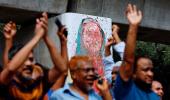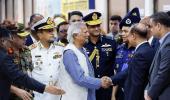'It was the hostility of the Yunus regime that made India careful and wary of dealing with them.'
'They gradually backed off and lowered the noise, but the damage was done.'
'Their true colours had been exposed.'

"Bangladesh has had a bloody history and always harboured anti-India sentiments. Whenever incumbent governments finds it is useful to stoke these sentiments, they do it for their advantage," explains Pinak Ranjan Chakravarty, India's former high commissioner to Bangladesh.
In his distinguished career in the Indian Foreign Service, the ambassador served two tenures in Dhaka, first as deputy chief of mission and then high commissioner.
He was also India's ambassador to Thailand and served in Cairo, Karachi, Jeddah, London and Tel Aviv.
In an interview to Rediff.com's Archana Masih, Ambassador Chakravarty discusses Muhammad Yunus' visit to China, India's security concerns on the border and the consequences of Bangladesh's tilt towards China.
Was Muhammad Yunus' comments interlinking the North Eastern states with China an innocuous remark offering China a mercantile opportunity to hawk its goods in the North East via Bangladesh, or does it have more sinister connotations to foment trouble?
It was a naive and unwarranted statement to lure Chinese investment through projects like the Chinese Industrial Economic Zone in Bangladesh.
Professor Yunus probably thinks if China starts production facilities in Bangladesh, then goods can enter India through the North East which will give a boost to Bangladesh exports.
Bangladesh has duty free market access into India, but bilateral trade is not conducted in such simple terms. India will certainly impose measures like Domestic Content Requirements.
He spoke about the seven sisters being landlocked which is a known fact. We don't need lessons in geography from Bangladesh.
To say that Bangladesh is the 'guardian of Bay of Bengal' was a bombastic statement.
Geographical vulnerabilities exist in every country. They exist in Bangladesh too and making such comments is futile.
India-Bangladesh have a relationship that goes back to the war of liberation. We have to deal with each other as neighbours which we have done with every government in Dhaka.

Could there be a sinister design behind these statements?
I think he was mainly referring to the economic side. If there is something sinister, I would expect that to come from Pakistan and partly China.
However, China has more or less stopped indulging in activities like supplying arms to insurgent groups which it had outsourced to Pakistan when the BNP-Jamaat coalition was in power till about 2006.
These camps wound up and ULFA leaders, for example, who were living and doing business there, were handed over to India.
That era is over. I don't think the sinister part that you mention is part of the narrative at the moment.
But, of course, there is always the issue of Bangladesh handing over certain projects to China which might be of concern to India because of proximity to our borders.
China will obviously use those opportunities to cause some strategic advantage for themselves either through espionage or through planting various devices.
That is a worry.
Dr Yunus was very effusive about China during the visit. He has also struck hospital deals thereby cutting off a major source of India's medical tourism.
All that he did in Beijing appears to have been done to spite India? Why?
The policies of this government are backed by anti-India elements in Dhaka like the Jamaat-e-Islami and student groups spewing anti-India rhetoric.
This sentiment is reflected in the policies adopted by the Yunus regime resulting in a tilt towards China and Pakistan because they feel India has become too dominating.
One must remember that this is a temporary government where everybody is hedging their bets.
They may enter into agreements which could be cancelled by the next government similar to what they are saying about deals signed by the Sheikh Hasina government.
There is plenty of uncertainty and that is why China hasn't offered too much during Yunus' trip. There were MoUs and expression of intent which is usually done during such high level meetings.
Pakistan is no position to help economically, but, of course, they can supply arms and ammunition. I doubt we will return to that era when they were hosting Indian insurgents, but the worry of terrorism remains because Islamists are back on the streets and in power.
The Yunus regime has released criminals and terrorists who are indulging in extortion and killing. Law and order has collapsed.
India will have to take measures along the border or use other methods that may be required if things go out of hand.

What will be the consequences of Bangladesh's tilt towards China and Pakistan?
There is nothing new about our smaller neighbours playing the China card to balance their relationship with other countries. However, there are limits because of their intense engagement with India.
For example, Sri Lanka had tilted towards China, but returned to India's fold after realising that China has its own axe to grind.
China did not help Sri Lanka like India did during the Sri Lankan economic crisis. Similarly, Bangladesh too will realise the same. Moreover, Professor Yunus has said that it is imperative to have good relations with India.
At the same time, one must keep in mind that there's a lot of doublespeak in Dhaka about India. That's the emerging narrative. It is very difficult to trust the present government in Bangladesh.
The atmosphere has built up because of their own actions, for example, the continuing atrocities on the minorities, Hindus and the tribal population.
How do you think India played its cards after Dr Yunus came to power? Was it right in denying visas to Bangladeshis after the attacks on the minorities in their country?
We handled it correctly because we knew that this government has no constitutional legitimacy and we dealt accordingly.
The visas issue is not just linked to minorities. It is linked to the fact that mobs attacked our visa issuing officers which made us withdraw many Indian staff members.
Unless Bangladesh provides a safe and secure environment, it's very difficult for us to send our consular staff.
Hence the visas had to be curtailed and issued only in urgent cases for medical treatment, students etc.

Does India's proximity to Sheikh Hasina and offering her sanctuary make it difficult for Indian diplomacy to deal with Bangladesh?
Let's remember one thing -- we did not invite Sheikh Hasina. It was on the request of the Bangladesh army that she was brought here in their own aircraft.
So to blame India is excessive. India-Bangladesh have an extradition treaty. Dhaka wants her extradited, but there is a process, you can't make demands and expect India to fulfil all demands.
It was the hostility of the Yunus regime that made India careful and wary of dealing with them.
Of course, they gradually backed off and lowered the noise, but the damage was done. Their true colours had been exposed.
Therefore, our decisions were based on the atmosphere that had been built up like the organised demonstrations and threats against the Indian high commission and anti-India rhetoric.
Have you seen such anti-India sentiments within the portals of governance and on the streets before? Or have we seen worse?
Bangladesh has had a bloody history in terms of government changes, military coups etc, and the anti-India sentiment has always been there.
When an incumbent government finds it useful to stoke these sentiments, they do it for their advantage.
They naively think that India will succumb and make some more concessions.
But it doesn't work like that.
The current group of students are inexperienced and acting emotionally rather than in a calculated manner.
It is a normal feature of smaller countries in our neighbourhood to blame India because it deflects the attention of the public from their own inadequacies and failures.

What do you expect from the Modi-Yunus presence at the BIMSTEC summit in Bangkok?
The official level dialogue continues -- the annual consultations on the Ganga Waters Treaty, interactions between our Border Security Force and the Border Guard Bangladesh etc.
I don't know whether Modiji and Professor Yunus will meet or shake hands and walk off. We'll have to watch.
Feature Presentation: Aslam Hunani/Rediff.com











 © 2025
© 2025